From the Cushitic branch of the Afro-Asiatic language family, the Oromo language is the fourth most spoken language following Arabic, Hausa, and Swahili. Making more than 33.8% of the entire country’s population and over 36 million speakers, they have the largest number of speakers next to Amharic. In this article, you will find 200+ basic Afan Oromo words and phrases you should know.
Pronouns in Oromo Language
In Afan Oromo, we use plural pronouns for the elderly. In this article, “E” in bracket stands for elderly, “S” for singular, “P” for plural, M for male, and F for female.
| Subject pronouns | Object pronouns | Possessive pronouns |
| I – Ani | Me – Ana/Na | Mine – Kan koo, Kiyya |
| You – Ati(S), Isin (E,P) | You – Si(S), Isin (E,P) | Yours – Kan kee, Keessan(E,P) |
| He – Inni | Him – Isa | Hers – Kan ishee |
| She – Isheen | Her – Ishee | His – Kan isaa |
| We – Nuyi | Us – Nuyi/Nu | Ours – Kan keenyaa |
| They – Isaan | Them – Isaan | Theirs – Kan isaanii |
Prepositions in Afan Oromo
- And – f/Fi (“-f” is used as a suffix.)
- But – Garuu
- Above (On) – Irra/Irrakeessa/Gubbaa / Gararraa
- Between – Gidduu
- Under – Jala / Gajjallaa
- Before – Ful dura/Fuullee
- Behind – Booddee / Booda/ Dudduuba / Dugda-duuba , The first two can also mean after
- Far – Fagoo
- Near – Dhihoo
- Besides – Bira/Bukkee
- In – Keessa
- Outside – Ala
- With (together) – Wajjin
- Besides – Malee
- From – Irraa
- To – Ittii
Days of the week in Oromifa
- Monday – Dafinoo, Wiixata
- Tuesday – Facaasaa , Kibxata
- Wednesday – Roobii
- Thursday – Kamisa
- Friday – Jimaata
- Saturday – Sanbata, Sanbat-duraa
- Sunday – Dilbata, Sanbata guddaa
Numbers in Oromo Language
- Zero – Zeeroo, Duwwaa (Can also mean empty)
- One – Tokko
- Two – Lama
- Three – Sadii
- Four – Afur
- Five – Shan
- Six – Jaha
- Seven – Torba
- Eight – Saddeet
- Nine – Sagal
- Ten – Kudhan
- Eleven, Twelve, Thirteen … – Kudha tokko, Kudha lama, Kudha sadii…
- Twenty – Digdama
- Twenty one, Twenty two …. – Digdami tokko, Digdami lama…..
- Thirty – Soddoma
- Thirty-one, Thirty two … – Soddomi tokko , soddomi lama…..
- Forty – Afurtama
- Forty one, Forty two -Afurtami tokko, Afurtami lama…..
- Fifty – Shantama
- Fifty one, Fifty two … – Shantami tokko, Shantami lama……
- Sixty – Jahaatama
- Sixty one, Sixty two … – Jahaataami tokko, Jahaataami lama…..
- Seventy – Torbaatama
- Seventy one, Seventy two … – Torbaatami tokko, Torbaatami lama…..
- Eighty – Saddeetama
- Eighty one, Eighty two … – Saddeetami tokko, Saddeetami lama…
- Ninety – Sagaltama
- Ninety one, Ninety two …. – Sagaltami tokko, Sagaltami lama…
- Hundred\ One hundred – Dhibba \ Dhibba tokko
- Hundred and\ One hundred and – Dhibbaf\ Dhibba tokkoof
- One thousand – Kuma tokko
- One hundred thousand – Kuma dhibba tokko
Telling time
- Time – Saatii\Yeroo
- What time is it? – Yeroon meeqa?
- 1:00 – Tokko
- 1:5 – Tokkoof shan
- 1:15 – Tokkoof ruubii
- 1:30 – Tokkoof walakkaa (walakkaa means half)
- 1:35 – Lama digdami shan hir’uu
- 1:45 – Lama ruub hir’uu
- 1:50 – Lama kudhan hir’uu
- When? / What time? – Yoom? / Yeroo kam?
- Yesterday – Kaleessa
- The day before yesterday – Dheengadda
- Today – Har’a
- Now – Amma
- Later – Booda
- Morning – Ganama / Waaree dura
- Afternoon – Waaree booda
- Evening – Galgala
- Night – Halkan
- Tomorrow – Bor
- The day after tomorrow – Iftaan/ Bor olee
- These days – Yeroo ammaa/Yeroo si’anaa
- A long time ago – Dur
Greeting
- How are you? – Akkam?, Jirtaa? (S), Jirtuu? (E, P)
- I am fine – Nagaa, Fayyaa
- Thanks to God – Waaqayyoon (Rabbiin) haa galatu
- I am sick – Na dhukkuba
- Are you better? – Sii wayyaa?, Isinii wayyaa?
- I am better – Naa wayyaa
- Good morning – Akkam bulte? (S), Akkam bultan? (E, P)
- Good afternoon – Oolmaan akkam?, Akkam oolte? (S), Akkam ooltan? (E, P)
- Good evening – Oolmaan akkam? , Akkam oolte? (S), Akkam ooltan? (E, P)
- Good night – Nagaan(nagaatti) buli, Nagaan(nagaatti) bulaa
- What are you doing? – Maal hojjetta? (S), Maal hojjettu? (E, P)
- Goodbye – Nagaattii, Nagaan, Jedhi (S), Jedhaa (E, P)
- Ciao – Chawo
- Have a good day – Guyyaa gaarii, Nagaan ooli(S), Nagaan oolaa (E, P)
- Get there safely – Nagaan gali(S), Nagaan galaa (E, P)
- Come back safely – Nagaan kottu(S), Nagaan kottaa (E, P)
How to introduce yourself in Oromo Language
- Let me introduce myself – Wal barra
- Name – Maqaa
- What is your name? – Maqaan kee eenyu?
- My name is …….. – Maqaaan koo ………. Jedhama
- Where are you from? – Eessaa dhufte? (S), Eessaa dhuftan? (E, P)
- Where is your country? – Biyyi kee eessa? (S), Biyyi keessan eessa? (E, P)
- I am from …… – Kanan dhufe …….dha
- ……. Is my country. – Biyyi koo ……… dha
- How old are you? – Waggaan kee meeqa? (S), Waggaan keessan meeqa? (E, P)
- I am …. (For age) – Waggan koo …..
- Do you speak (know) English? – Ingiliffa beektaa? (S), Ingiliffa beektuu? (E, P)
- What is your number? – Bilbilli kee meeqa?
- What is your job? – Hojiin kee maali?
Other common words in Oromo Language
- Human – Nama
- Earth – Lafa
- Home\ house – Mana
- Food – Nyaata
- Drink – Dhugaatii (also refers to alcoholic drinks)
- Water – Bishaan
- Tree – Muka
- Farm – Qonnaa
- Education – Barumsa
- School – Mana barumsaa
- Student – Barataa
- Teacher – Barsiisaa
- Car – Konkolaataa, Makiinaa
- Toilet – Mana fincaanii
- Good – Baroo, Gaarii
- Bad – Gadhee
- No – Lakki, Hi’i, Hi’iyyoo
- Yes – Eeyyee
- Never – Gonkumaa
- Always – Yeroo hundumaa
- Nothing – Homaa
- Okay – Tole
- Please – Maaloo
- Thank you – Galatoomi(S), Galatoomaa(E, P)
- Small\ a little – Xinnoo
- Big – Guddaa
- Well – Sirriitti
- Mr – Obbo
- Mrs – Aadde
- Job \career – Hojii
- It’s not – Miti
- Left – Bitaa
- Right – Mirgaa
- Body – Dhanna/Qaama
- Market – Gabaa
- Shop – Suuqii
- Clothes – Uffata\ Wayyaa
- Shoes – Kophee
- Table – Minjaala
- Bed – Siree
- Chair – Barcuma
- Stool – Dombii
- Sleep (n) – Hirriba
- Sleep (v) – Rafuu
- To see – Ilaaluu/Arguu
- Listen – Dhaga’uu
- Go – Deemi (S), Deemaa(E, P) , Deemuu( to go)
- Sit – Taa’uu
- Stand – Dhaabachuu
Parts of the body in Afan Oromo
| Hair – Rifeensa Skin – Gogaa Nail – Qeensa Bone – Lafee Joint – Buusaa Blood – Dhiiga Head – Mataa Brain – Sammuu Face – Fuula Forehead – Adda Eyebrow – Nyaara Eye – Ija Nose – Funyaan Cheek – Maddii Jaw – Mangaagaa Ear – Gurra Lip – Hidhii Teeth – Ilkaan Tongue – Arraba Throat – Qoonqoo Neck – Morma Shoulder -Gatiittii/Gurmuu Back – Dugda | Chest – Laphee Breast – Harma Ribs – Cinaacha Heart – Onnee Lung – Soomba Belly – Garaa Stomach – Garaacha Liver – Tiru Gut – Marimmaan Waist – Mudhii Buttock – Hudduu Arm – Irree Armpit – Bobaa Elbow – Ciqilee Hand – Harka Palm – Barruu Thigh – Sarbaa Knee – Jilba Leg – Luka Heel – Koomee Foot – Miilla, Faana Finger – Quba |
Animals in Oromo Language
| Dog – Saree Cat – Adurree, Bashoo Chicken – Handaaqqoo, Lukkuu Pig – Booyyee, Karkee Sheep – Hoolaa Goat – Re’ee Camel – Gaala Donkey – Harree, Humaara Horse – Farda Mouse – Hantuuta Ox – Sangaa Cow -Sa’a Calf – Jabbii | Monkey – Qalamee Ape – Jaldeessa Bird – Simbirroo, Simbira Bat – Simbira halkanii Dove – Gugee Duck – Daakiyyee Vulture – Alaattii Snake – Bofa Lion – Leenca Tiger – Qerransa Hyena – Waraabessa Elephant – Arba Tortoise – Qocaa |
Colors in Oromo Language
- Color – Bifa\ Haalluu
- Black – Gurraacha
- White – Adii
- Silver – Daalacha/ Bifa daaraa
- Red – Diimaa
- Green – Magariisaa
- Blue – Gara waaq
- Yellow – Keelloo
- Orange – Burtukaanaa
- Lime – Loomii
- Brown – Daammii/Bunnii
- Pink – Dimine
- Purple – Siddisa
Family members in Oromo Language
- Family – Maatii
- Relative – Fira
- Close relative – Fira dhihoo
- Far relative – Fira fagoo
- Grandparent – Akaakayyuu
- Grandfather – Akaaka
- Grandmother – Akkoo
- Father – Abbaa
- Mother – Haadha/Harmee
- Husband – Abbaa warraa (Abbaa manaa), Dhirsa (informal)
- Wife – Haadha warraa (Haadha manaa), Niitii (informal)
- Maternal uncle – Eessuma
- Paternal uncle – Wasiilaa
- Aunt – Adaadaa
- Kid – Mucaa
- Kids – Ijjoollee
- Son – Ilma
- Daughter – Intala
- Elderly – Nama Guddaa
- Old – Jaarsa (F), Jaartii (M)
- Neighbor – Ollaa
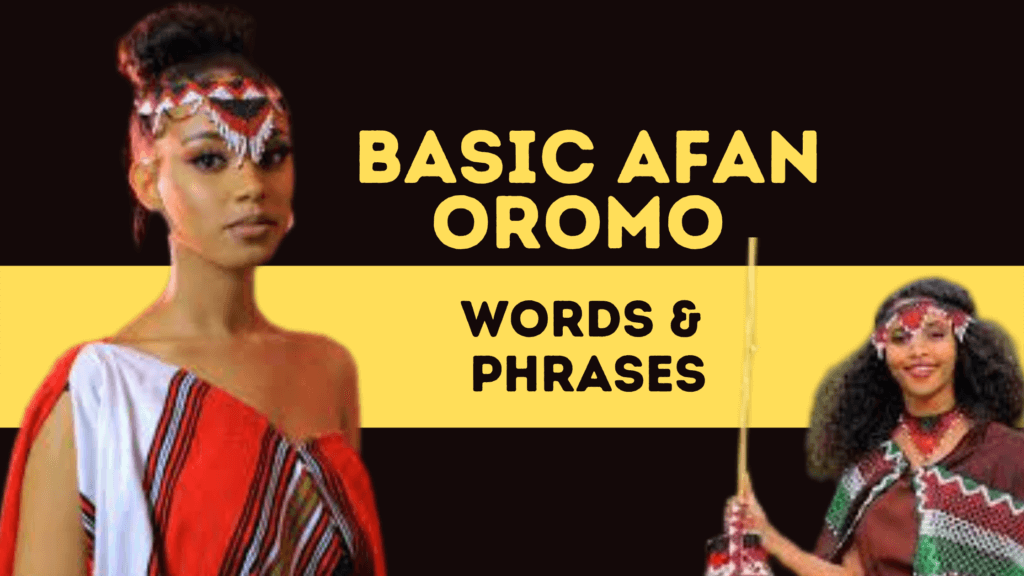

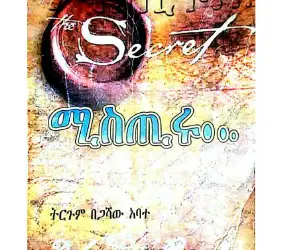
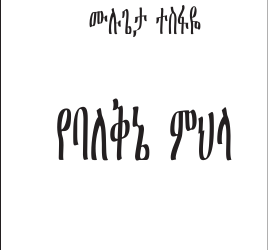
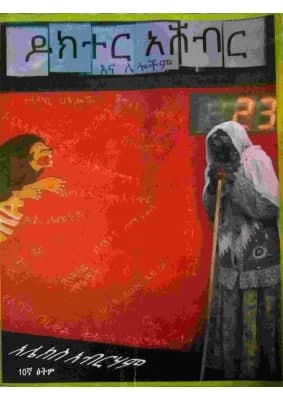
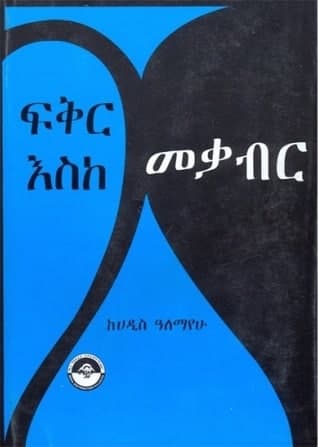
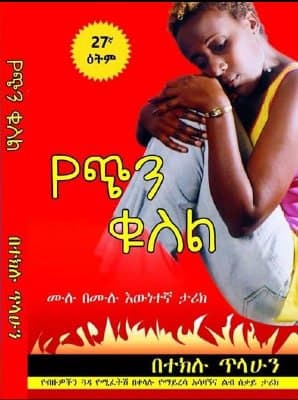
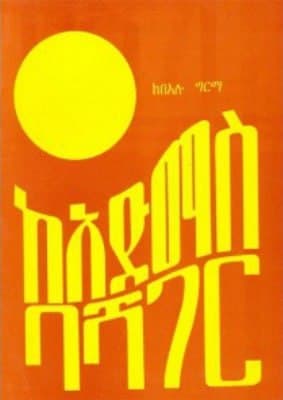
0 Comments